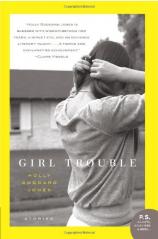Reading Group Guide
Discussion Questions
Girl Trouble

1. How do you interpret the title of the collection, Girl Trouble? How do you think it encompasses or excludes the issues that also face the men in these stories?
2. There is a heavy theme of "goodness" throughout these stories—"good girl," "good man"—but what do you think marks the goodness in these characters? For instance, do you believe that Simon, in spite of being a killer, is ultimately sympathetic in some ways? What do you make of Theo starting an affair with Josie two weeks before his daughter's diagnosis in "Life Expectancy," Ben's father's choice of a field trip in "Allegory of a Cave," or Stephen's coldness in "Retrospective?"
3. In "Parts," Felicia's mother mentions that "sex is always violent." Would you agree with that statement in the context of these stories? Do you see the sexual encounters between the men and women here as acts of violence?
4. What do you make of the placement of the linked stories "Parts" and "Proof of God"? Why does Simon's story, which precedes "Parts" chronologically, come at the end of the collection? How did your feelings about Simon change after reading "Proof of God?" Who do you think vandalized Simon's car at the very end?
5. In "Parts," Simon doesn't recognize Felicia's mother and they don't have the confrontation that a part of her yearns for. Did that surprise or disappoint you, or was that even needed as a release in the story? If such a confrontation did occur, what would you expect would happen?
6. Do you see these stories as parts of a whole, or as separate entities? What do you make of the chronology of this collection? If you had to draw links between these stories, what would they be?
7. Do you see mothers and fathers as having separate roles in these stories? How do you think they are differentiated? Felicia's mother's approach to Felicia's death in "Parts" versus Art's, for example, or in "Allegory of a Cave" when Ben says, "His father was, as fathers tend to be, another case."
8. In "Theory of Realty," what do you think might have happened if Ellen had given in to Ray's protests and hadn't left Ray's house during their sleepover?
9. For these stories, Jones has been praised for her ability to capture intangible feelings: sadness, loss, love. How do you think the physical markers in these stories—the dog in "Good Girl," the house in "Retrospective"—help to capture these feelings? How did they help with your understanding of the story's themes? What are some other memorable markers?
10. In "Retrospective," when Libby goes through the memorabilia from her marriage to Stephen, she looks back on "her old and better self." The theme of parts and selves is prevalent in these stories --- how would you describe the different selves of some of the characters in the book: Jacob in "Good Girl," Theo in "Life Expectancy," Art in "Parts," Ben's father in "Allegory of a Cave," Ellen in "Theory of Realty"?
11. A higher power and/or a greater plan seems to be a consistent thread throughout these stories --— Ben's eyesight, Theo's baby's "life expectancy," Libby mentioning "the hand" she's been dealt. Do you think that these stories suggest that there is a higher power at work? A "proof of God," so to speak? Which characters do you think have the agency to determine the course of their lives?
Girl Trouble
- Publication Date: September 1, 2009
- Paperback: 368 pages
- Publisher: Harper Perennial
- ISBN-10: 0061776300
- ISBN-13: 9780061776304








